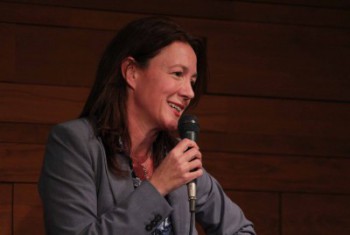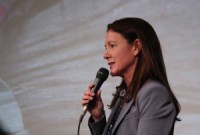This event now concluded. Report available here.
- Lecturer: Anne McDonald (Professor, Sophia University)
- Date: Tuesday, February 2, 2016, 6:00-7:30 pm
- Venue: Iwasaki Koyata Memorial Hall, International House of Japan
(The venue has been changed from the Lecture hall.) - Language: Japanese (without English interpretation)
- Organizers: International House of Japan, Inter-University Center for Japanese Language Studies, and Nippon Foundation
- Admission: Free
Professor Anne McDonald, who has traveled all around Japan’s coastal areas as a researcher in environmental history for over 20 years, will talk about her observations on Japan’s biological and cultural diversity in coastal communities; the problems those communities face; and the national policy-making process.
Anne McDonald
 |
Report
Canadian-born Anne McDonald, who now teaches environmental history at Sophia University in Tokyo, has been conducting field research in Japanese agricultural and fishing communities for over two decades. A firm believer in the hands-on approach, she has visited some 80 percent of Japan’s coastal areas, traveling around in a minivan, and even today takes the time to join ama female divers in the sea. She regularly participates in domestic and international environmental conferences as an expert and helps link local producers with the policymaking community. At the February 2, 2016, IUC Lecture, Professor McDonald spoke on the biological and cultural diversity of the Japanese archipelago and on the challenges facing Japan’s farming and fishing villages and policymakers in the face of climate change.

Facing the Threat of Climate Change
The presence of great natural and cultural diversity from north to south makes Japan an ideal place to study the social impact of climate change, says Professor McDonald. “You can see how the sea changes by driving down along the coast for just five kilometers,” she notes. “And when the sea changes, the types of boats and fishing techniques change, and naturally the lifestyles of local residents also change. Japan’s coastline is a truly wonderful place for research.”
Food producers are among the most strongly affected by global warming, she said, as floral habitats expand northward. This could, for example, force apple growers to switch to citrus production. “That’s not easy to do. It’s going to take at least ten years to make that shift. How are these farmers to survive during those years? Should the government continue to provide subsidies?”
Selective breeding is helping meet the climate change challenge, one notable example being the Nikomaru variety of rice developed in Kyushu that is capable of withstanding warmer weather. “Climate patterns, such as rainfall and hours of daylight, have been undergoing a change,” Professor McDonald said, “and this had relegated Kyushu-grown rice to second-class status since around 2004–5.” Warmer temperatures will henceforth likely have serious repercussions in locations throughout Japan.
Science Combined with Traditional Knowledge
New rice varieties that can better adapt to changing weather may be seen as a success story engendered by technological advances. But science does not always have the answers. “High technology alone can’t save people’s livelihoods, especially in the more vulnerable regions, due to a lack of the human and financial capital to put those technologies to work.” McDonald points out that some 70 percent of the food humans consume each year is produced by small-scale farmers and fishermen.

McDonald believes a more feasible solution would be to combine science with traditional knowledge. “Humankind has learned a great deal over the years by both engaging nature and at times fighting it. Such accumulated knowledge should be tapped in adapting to climate change and preserving biodiversity.”
Hints for Developing Countries
One such undertaking is the research involving the ama divers of Hegura, an island 50 kilometers off the Noto Peninsula in the Sea of Japan. These women free divers know the sea inside and out, and McDonald has been interviewing them for four years to learn how the waters change with the seasons and to ascertain shifting harvest areas. Working with fishery officials of the Ishikawa prefectural government, she is contributing to an effort to develop a fishing policy that can prevent the exhaustion of marine resources. Professor McDonald concluded her lecture by expressing the hope that the findings of research into Japan’s environment, food production, and traditions would someday become a valuable source of reference for policymakers in developing countries.
*This lecture series is part of the Nippon Foundation Fellows Program at the Inter-University Center for Japanese Language Studies.